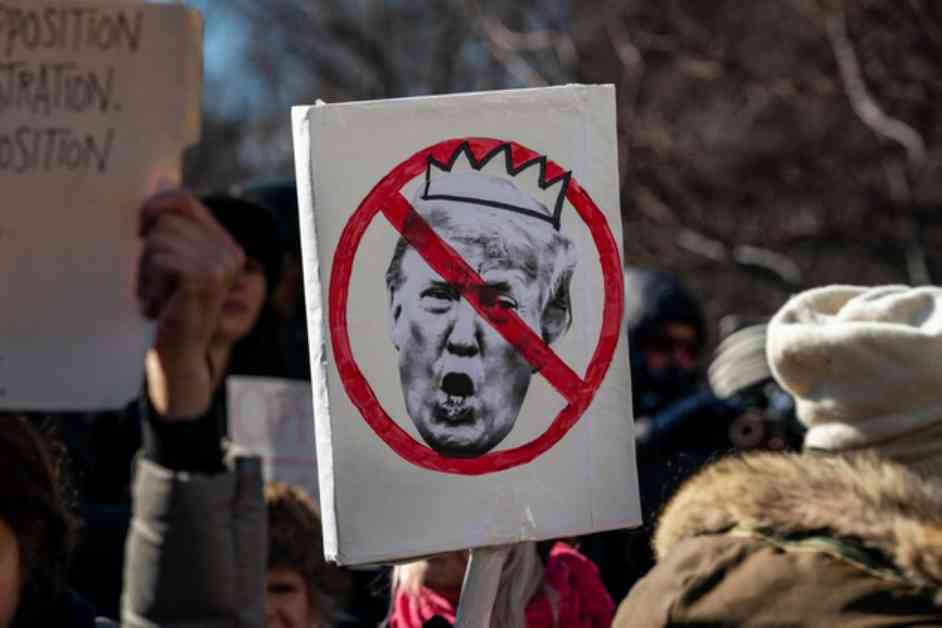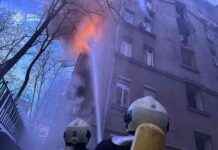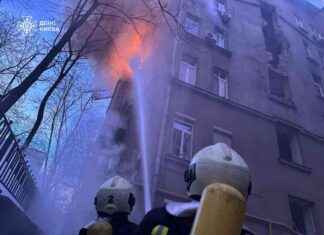Thousands of Americans took to the streets across the nation on President’s Day to voice their discontent with various policies and decisions of President Donald Trump, particularly his handling of Russia’s invasion of Ukraine. Amidst concerns and even panic spurred by the new administration’s actions, protesters rallied against Trump in cities like New York, Pittsburgh, and others, waving American flags and brandishing handmade signs condemning the president’s recent measures as authoritarian. This marked the second nationwide protest since Trump’s return to the Oval Office.
The protests were not just about policies and politics; they were a reflection of the deep-seated fears and anxieties the American public harbored concerning the future of democracy, both in the United States and abroad. Among the demonstrators were Rostyslav Boykowycz and his wife Kathy, who joined others in Pittsburgh to critique Trump’s actions regarding Ukraine. For Rostyslav, an 86-year-old architecture professor and a former Ukrainian refugee, the parallels between the situations in the US and Ukraine were stark. “The Ukrainian plight is similar to the American plight at this time,” he expressed, underlining the looming threat of authoritarianism that imperils both nations.
The demonstrations shed light on the ripple effects of Trump’s decisions, not just domestically but also on the international stage. The abrupt shift in US-Russia relations following Trump’s “great” conversation with Russian President Vladimir Putin, after a prolonged diplomatic hiatus, left allies in Ukraine and Europe bewildered. The subsequent initiation of peace talks without the involvement of Kyiv contradicted America’s longstanding pledge to never negotiate about the war in Ukraine without Ukraine. These developments, coupled with rumors of bilateral meetings and potential agreements, fueled fears of Ukraine being sidelined or coerced into unfavorable settlements.
As the geopolitical landscape continued to evolve, discussions around post-war peacekeeping efforts in Ukraine gained traction. The consensus on the necessity of peacekeepers to monitor hostilities raised pertinent questions about the nature and composition of such a mission. Speculations about the involvement of China, Brazil, and the UN in a peacekeeping force emerged, hinting at the complexities and challenges of maintaining peace in the region post-conflict.
The voices of concern echoed not only in the streets but also in international forums like the Munich Security Conference, where American officials’ remarks fueled apprehensions about Ukraine’s future. The readiness of UK and French leaders to dispatch troops under their national flags, albeit outside of NATO, underscored the urgency and gravity of the situation. Amidst these deliberations, the resolute stance of Ukrainian President Volodymyr Zelensky, asserting Ukraine’s sovereignty and refusal to accept agreements made without its involvement, highlighted the unwavering spirit of a nation embroiled in conflict.
Katie Livingstone, an esteemed American journalist with a notable career covering the war in Ukraine, encapsulates the essence of these tumultuous times. Her extensive work illuminating the impact of conflict and foreign policy on individuals and societies resonates deeply in the current climate of uncertainty and upheaval. In a world grappling with shifting power dynamics, looming authoritarianism, and the delicate balance of international relations, her insights offer a poignant reflection of the interconnectedness of global affairs and the human stories at their core.
As the protests reverberate through the streets and the halls of power, the collective voice of the American people resonates with a resounding message – a plea for democracy, justice, and solidarity in the face of adversity. In a time of unprecedented challenges and unforeseen developments, the resilience and resolve of individuals like Rostyslav Boykowycz, Katie Livingstone, and countless others stand as a testament to the enduring spirit of democracy and the pursuit of a better, more just world.

















